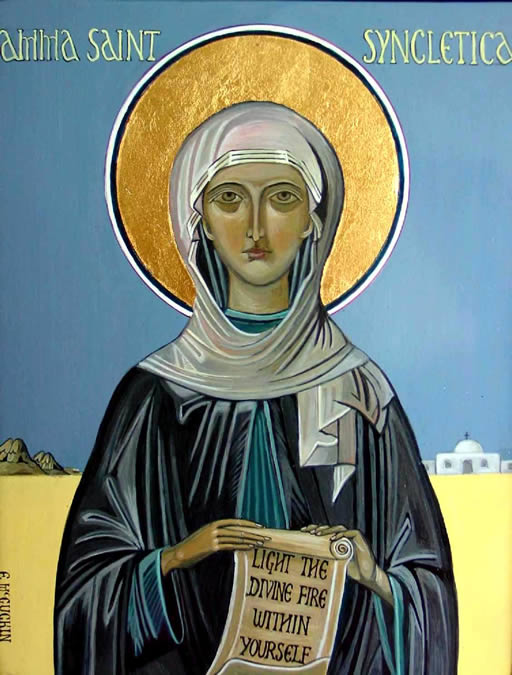 ~~Icon of Saints John Climacus, John of Damascus and Arsenius the Great
~~Icon of Saints John Climacus, John of Damascus and Arsenius the GreatThey used to say of Arsenius that no one could understand the depths of his monastic life. Once when he was living in Lower Egypt, and suffering from importunate visitors, he decided to leave his cell. He took nothing with him and said to his disciples, Alexander and Zoilus, "Alexander, you go on board a ship, and you, Zoilus, come with me to the Nile, and find me a little boat that is sailing to Alexandria, and then go and join your brother."
Zoilus was sad at this, but said nothing, and so they parted, Arsenius went down to the district near Alexandria, and there fell gravely ill. His disciples said to each other, "Do you think one of us has upset him? Is that why he has left us?"
They examined themselves but could not see any way in which they had been ungrateful to him, or had ever disobeyed him. When Arsenius had recovered from his illness, he said to himself, "I will go back to my brothers."
So he went to the place called Petra, where Alexander and Zoilus, his servants were. While he was by the river bank, he met an Ethiopian girl, who came up and touched his cloak. He rebuked her but she said, "If you are a monk, go to the mountain."
At these words he was stricken to the heart, and said to himself, "Arsenius, if you are a monk, go to the mountain." On the way his disciples Alexander and Zoilus met him, and fell at his feet. Arsenius also threw himself on the ground and they all wept. Then Arsenius said, "Didn't you hear that I was ill?"
They said to him, "Yes, we heard about it."
He said, "Then why didn't you come to see me?"
Alexander said, "We were upset by your going away from us, for many people were shocked about it and said, 'they must have disobeyed the hermit or surely he would not have left them.'"
Arsenius said to them, "Yes, I knew that would be said, but now it shall be said, 'The dove found rest for her foot, and so returned to Noah in the ark.'" The feelings of his disciples were healed by this, and they stayed with him until the end of his life.
When he lay dying, they were very distressed. He said to them, "The hour is not yet come, but when it does come I will tell you. You will be judged with me before the judgement seat of Christ, if you let anyone else touch my dead body."
They said, "Whatever shall we do? We don't know how to clothe or bury a dead body."
Then Arsenius said, "I suppose you know enough to tie a rope to my leg and pull me up the mountain?"
When he was about to commit his soul to God, they saw him weeping, and said, "Abba, are even you afraid of death?"
He said, "Yes, indeed. The fear which possesses me now has been with me since I became a monk: and I am very much afraid." So he slept in peace.
Arsenius always used to say this, "Why words, did I let you get out? I have often been very sorry that I have spoken, never that I have been silent."
When Poemen heard that Arsenius had departed this life, he wept and said, "You are blessed, Arsenius, for you wept for yourself in this world. Whoever does not weep for himself in this world, shall lament for ever in the next. We cannot escape lamentation; if we do not lament here of our own will, we shall later be forced to lament against our will."
Feastday: July 19, 450
Confessor and hermit on the Nile, Arsenius, who was born in Rome in 354, was the tutor of the children of Emperors Theodosius I the Great, Arcadius, and Honorius. At that time, Arsenius was a Roman deacon recommended for the office by Pope St. Damasus; he served at Theodosius' court in Constantinople for about ten years and then became a monk in Alexandria, Egypt. Inheriting a fortune from a relative, Arsenius studied with St. John the Dwarf and became a hermit in the desert of Egypt. In 434, he left Scetis and went to the rock of Troe, near Memphis, Egypt, and to the island of Canopus near Alexandria. He died at Troe. Arsenius is sometimes called "the Roman" or "the Deacon."

No comments:
Post a Comment